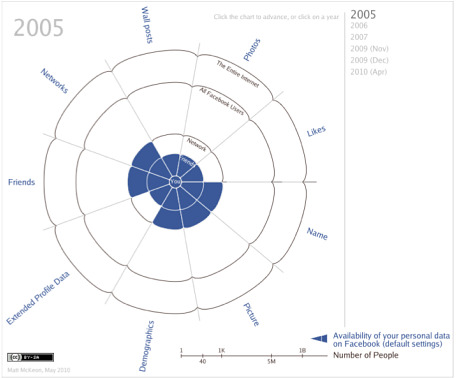As Facebook continues to steadily invade its users’ privacy, it’s been somewhat difficult to convey how exactly this has happened. The best thing I’d seen was the Electronic Frontier Foundation timeline of the site’s privacy changes.
But Matt McKeon, a research developer at IBM, has come up with a brilliant graphical depiction of Facebook’s creepy creep into owning your info. Click through and see how Facebook’s changed since 2005.
Again, brilliant. Sometimes an interactive graphic is worth ten thousand words.
(h/t Zach Seward)
— Pulitzer winning editorial cartoonist Mark Fiore, whose iPhone app was rejected by Apple for “ridicul(ing) public figures” (Apple later backtracked), tells Politico what he’s going to do with his $10,000 in Pulitzer cash:
“Besides paying down a credit card, I’ll probably put some of the money into updating my “NewsToons” iPhone app that was approved once I became a newly-minted Pulitzer Prize recipient. Since winning the prize brought attention to Apple’s policy of rejecting iPhone apps that “ridicule public figures” I figure the least I can do is devote more resources to ridiculing public figures.”
Nice.
— “Carnage.” That’s how the Financial Times‘s Alphaville describes the credit markets today:
We’ve become inured to days of extreme volatility in the credit markets but today was extraordinary even by recent standards…
Spreads widened in monumental moves reminiscent of the post-Lehman days and the weeks of the banking crisis in early 2009…
Banks have been under severe pressure this week and it became more intense today amid fears that the sovereign contagion could infect the financial system. It was all too clear last year that banks require the backstop of the state to exist in times of crisis. If the solvency of the government is in doubt then that clearly threatens the viability of the domestic banking system. The cross-border links between banks in the eurozone are well-known, and investors have been scrambling to figure out what institutions have most exposure to the periphery.
Happy weekend to you!
Ryan Chittum is a former Wall Street Journal reporter, and deputy editor of The Audit, CJR’s business section. If you see notable business journalism, give him a heads-up at rc2538@columbia.edu. Follow him on Twitter at @ryanchittum.

